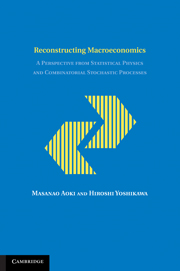 Reconstructing Macroeconomics
Reconstructing Macroeconomics Published online by Cambridge University Press: 08 August 2009
In his 1844 essay, “On the Influence of Consumption upon Production,” J. S. Mill endeavored to refute the belief that, “A great demand, a brisk circulation, a rapid consumption (three equivalent expressions) are a cause of national prosperity.” In this book, we take up the old belief and propose that aggregate demand does matter in the determination of total output. The argument requires a drastic turn in macroeconomic, theory and introduces new methods. The purpose of this book is to explain the new approach. Readers will see how new methods and concepts broaden the scope of macroeconomics and shed new light on old problems such as demand deficiency, inflexible prices, business cycles, and asset prices.
The idea that demand matters was, of course, established by Keynes (1936) – indeed, macroeconomics used to be synonymous with Keynesian economics. Alas, no more! Keynes' principle of effective demand – that aggregate demand determines the level of aggregate production or output – is in stark contrast to the neoclassical doctrine that aggregate output is determined solely by supply factors such as factor endowments and technology, and that demand is relevant only with respect to composition of outputs. Despite its empirical attractiveness, Keynesian economics has long been charged with lacking microeconomic foundations. The need for microeconomic foundations meant that the optimization of agents had to be explicitly considered in models.
Many economists have come to believe that the first principle of economics is the optimization of economic agents such as household and firm.
To save this book to your Kindle, first ensure no-reply@cambridge.org is added to your Approved Personal Document E-mail List under your Personal Document Settings on the Manage Your Content and Devices page of your Amazon account. Then enter the ‘name’ part of your Kindle email address below. Find out more about saving to your Kindle.
Note you can select to save to either the @free.kindle.com or @kindle.com variations. ‘@free.kindle.com’ emails are free but can only be saved to your device when it is connected to wi-fi. ‘@kindle.com’ emails can be delivered even when you are not connected to wi-fi, but note that service fees apply.
Find out more about the Kindle Personal Document Service.
To save content items to your account, please confirm that you agree to abide by our usage policies. If this is the first time you use this feature, you will be asked to authorise Cambridge Core to connect with your account. Find out more about saving content to Dropbox.
To save content items to your account, please confirm that you agree to abide by our usage policies. If this is the first time you use this feature, you will be asked to authorise Cambridge Core to connect with your account. Find out more about saving content to Google Drive.